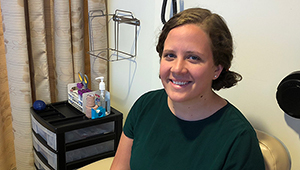Heart health researcher Laura B. Harrington joins KPWHRI

Dr. Laura B. Harrington
KPWHRI gains an expert in studying cardiovascular diseases, including venous blood clots, especially in women and older adults
Dr. Laura B. Harrington, PhD, MPH, is an epidemiologist with a particular interest in cardiovascular risk among older women and risk factors associated with developing venous blood clots (called venous thromboembolisms—VTEs) in the legs, pelvis, and lungs. In August, Dr. Harrington moved from Boston to join the Kaiser Permanente Washington Health Research Institute (KPWHRI) faculty, although this is not her first time living in Seattle. She first started studying cardiovascular health while completing her PhD in epidemiology at the University of Washington (UW).
At the UW, Dr. Harrington studied how levels of naturally circulating hormones and events associated with changes in these hormones might be associated with a woman’s risk of developing a VTE. This work built on her longstanding interest and passion for women’s health, which she developed while working toward her MPH at the University of Michigan.
“My research works to improve our understanding of the etiology, prevention, and treatment of cardiovascular diseases,” Dr. Harrington says. “And I’m especially passionate about working in populations of older women and older adults more generally, since these populations are sometimes understudied.”
After completing her PhD at UW, Dr. Harrington began a National Heart, Lung, and Blood Institute (NHLBI)-funded Ruth L. Kirschstein postdoctoral fellowship in the Harvard T.H. Chan School of Public Health’s Department of Nutrition. During this three-year fellowship, she gained training and experience in working with lifestyle-based cardiovascular risk factors and evaluated dietary risk factors in relation to VTE risk. She became increasingly interested in how a person’s risk for VTE might be linked to other lifestyle-based risk factors, including physical activity and sedentary behavior.
“Some of the traditional lifestyle-based risk factors for arterial cardiovascular events, such as physical activity and sedentary behavior, aren’t as well characterized in relation to venous events,” Dr. Harrington says. She now has a career development grant for early-career scientists from NHLBI that allows her to study this relationship over the next five years while gaining experience in areas that will support her scientific career and lead to future research.
As part of this project she is analyzing data from three large ongoing studies, the Women’s Health Initiative, and the Nurses’ Health Studies I and II. Dr. Harrington will also collect new data from a group of Kaiser Permanente Washington enrollees soon after they have experienced a VTE to learn more about possible triggers for their event.
Dr. Harrington hopes that an improved understanding of physical activity and sedentary behavior in relation to VTE risk may someday lead to interventions that can help to reduce risk among people at high-risk for these events. “I’m excited to be conducting this research at KPWHRI,” she says. “My hope is that one day my research will contribute to reducing cardiovascular risk among Kaiser Permanente Washington enrollees and the public more broadly.”
- by Susan Brandzel, MPH, KPWHRI senior public health research manager
KPWHRI Newsletter

October 2018
- Volunteering for health research: To join or not to join?
- Kaiser Permanente researchers study bariatric surgery for obese teens
- CATALyST K12 Scholar Program: A spark for future LHS researchers
- Addressing economic disparity while growing membership: Lowering cost is essential
- What do patients understand about dementia prevention?





